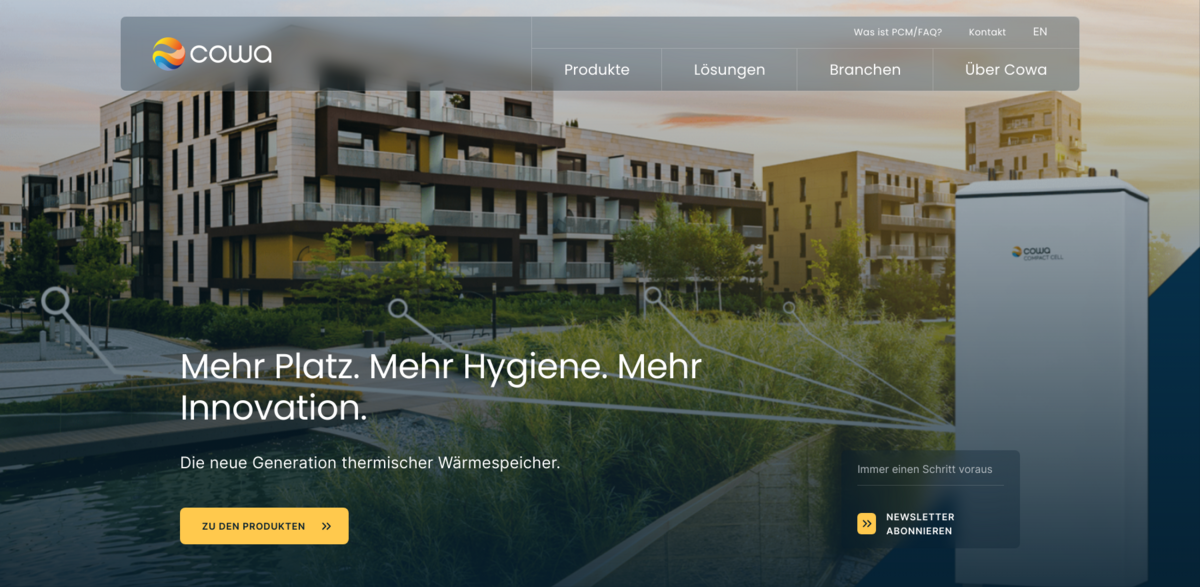What Is the Cowa Thermal Solutions AG Project?
Cowa Thermal Solutions AG, based at Technopark Luzern in Switzerland, is known for its innovative, compact, and high-performance thermal storage solutions. This project focuses on developing a cutting-edge, space-saving thermal storage system tailored for modern heating systems in residential buildings. By integrating conventional heat pump water storages with capsules filled with Phase Change Materials (PCM), the system tackles the common challenge of the temporal mismatch between peak photovoltaic (PV) electricity production and the heating demand in buildings. Imagine storing energy produced during the bright midday hours and then releasing that energy when the sun isn’t shining – that’s exactly the magic of this technology, driven by Swiss innovation and a commitment to sustainability.
Main Benefits of the Compact Thermal Storage Solution
The project offers multiple key benefits that stand out in the renewable energy landscape, particularly for residential decarbonisation. Key figures and facts include:
- Cowa Compact Cell Buffer Storage that is cubic, space-saving, and easily expandable.
- Domestic Hot Water Storage capable of preparing up to 400 liters of hygienically treated hot water.
- Combination Storage delivering up to 700 liters of hot water in a compact solution optimized for heat pumps and PV systems.
- Enhanced storage capacity through innovative salt hydrate-based PCMs, achieving up to five times higher energy density.
- The ability to boost the self-consumption ratio of PV-driven heat pump systems from 30% to an impressive 70%.
Innovative Thermal Storage Technology
The compact storage technology developed by Cowa is based on capsules filled with high energy density Phase Change Materials. These materials harness the energy from a solid-liquid phase transition, storing excess energy in a much smaller space compared to conventional thermal stores. Standardized commercial products and custom-made solutions are available, catering to a wide range of heating and domestic hot water systems. This approach, relying on a smart mix of salt hydrates and modern engineering, not only maximizes the energy storage capabilities but also ensures the system remains flexible and adaptable to evolving energy demands.
Efficiency of Domestic and Buffer Storage
The domestic hot water storage and buffer storage systems from Cowa integrate seamlessly into modern heating systems. With the Cowa Compact Cell Domestic Hot Water Storage, hot water is prepared instantaneously, ensuring that up to 400 liters of fresh, hygienic water is always available. Meanwhile, the Cowa Compact Cell Buffer Storage provides an efficient way to store energy excesses that typically occur when rooftop photovoltaic (PV) systems are coupled with heat pumps. This system is especially advantageous since it leverages the high energy density of salt hydrates, enabling the storage space to be reduced by up to four to five times. It’s a modern solution that handles the mismatch between energy production and heating demand with ease… practically making energy use more efficient and cost effective.
Versatile Solutions for Modern Heating Systems
The project is not confined to a single product; it expands into offering a range of products suited for different applications: the Compact Cell Buffer Storage, the Compact Cell Domestic Hot Water Storage, and the Compact Cell Combination Storage. The latter efficiently combines hot water and heating storage into one cubic and compact design, making it highly adaptable for integration with both heat pump and PV systems. Furthermore, the option for individual thermal storage solutions means that manufacturers can have products tailored to specific technical requirements – a flexible approach that reinforces the project’s focus on innovation and sustainability in both standardized commercial products and customized applications.
Advanced Engineering for Energy Optimization
At its core, the project by Cowa addresses an important challenge in renewable energy systems – the ability to store excess PV electricity for use during periods of solar outage. Rooftop PV systems, while excellent at generating renewable energy, often face a mismatch with the residential heating demand. By introducing a robust thermal storage method using a modular and expandable design, the project effectively bridges this gap. The extra storage capacity provided by the innovative COWA-Caps elevates the self-consumption ratio from an average of 30% up to 70%, making the overall system significantly more efficient. This technology paves the way for more resilient energy solutions in a time when decarbonisation and energy efficiency are paramount.
Project Impact on Sustainable Development
- SDG 7: Affordable and Clean Energy – enhancing energy self-consumption and providing efficient renewable energy storage.
- SDG 9: Industry, Innovation, and Infrastructure – driving cutting-edge engineering design and the integration of advanced materials.
- SDG 11: Sustainable Cities and Communities – supporting the transition of urban environments to sustainable heating and energy systems.
- SDG 13: Climate Action – reducing greenhouse gas emissions through optimized energy use in residential buildings.
Future Perspectives for Thermal Storage and Renewable Integration
The dynamic integration of thermal storage solutions with residential heating systems represents a significant leap forward in renewable energy usage. Cowa’s project has demonstrated that by blending innovative engineering with sustainable raw materials, it is possible to dramatically enhance the efficiency of heating systems powered by PV and heat pumps. This advancement is a promising indicator for future developments in the field, where continuous improvements in compact cell design, phase change material applications, and modular storage applications are expected to further increase the self-consumption ratio of renewable energy systems. The journey is just beginning… and as technology evolves, the potential impact on decarbonisation and everyday energy use appears boundless, solidifying its role in rapidly advancing sustainable energy solutions worldwide.


















